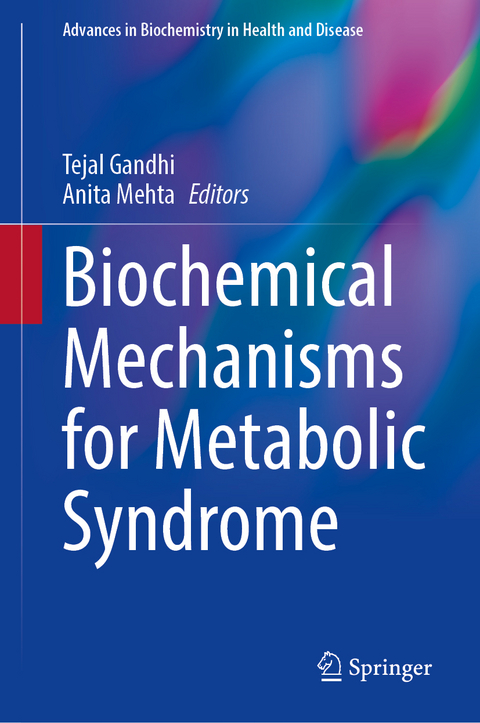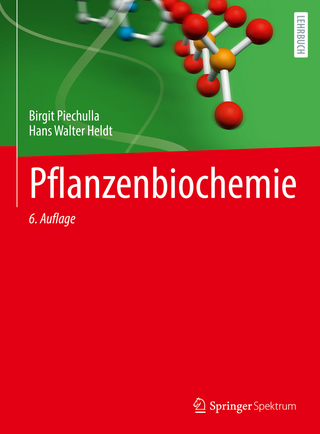
Biochemical Mechanisms for Metabolic Syndrome
Springer International Publishing (Verlag)
978-3-031-75685-6 (ISBN)
- Noch nicht erschienen - erscheint am 20.01.2025
- Versandkostenfrei innerhalb Deutschlands
- Auch auf Rechnung
- Verfügbarkeit in der Filiale vor Ort prüfen
- Artikel merken
The book "Biochemical Mechanisms for Metabolic Syndrome" delves into the intricate biochemistry underlying the complex condition known as Metabolic Syndrome. The main focus of the book is to provide a comprehensive overview and in-depth exploration of the various biochemical processes and molecular mechanisms contributing to the development and progression of Metabolic Syndrome. The book is structured into several chapters, each with a specific purpose.
The initial chapters, lay the groundwork by introducing the concept of Metabolic Syndrome, its historical context, prevalence, and the risk factors associated with it. Subsequent chapters tackle various aspects of insulin resistance and its underlying mechanisms, lipid metabolism dysregulation, the impact of obesity, and the complex interplay between Metabolic Syndrome and hypertension. The book then shifts focus to exploring the genetic predisposition to Metabolic Syndrome and delves into recently explored indepth cellular and tissue mechanisms, including the role of gut barrier dysfunction and adipose tissue remodeling. Chapters dedicated to molecular mechanisms and signaling pathways offer a deeper understanding of the inflammatory resolution, and endoplasmic reticulum stress in the context of Metabolic Syndrome. Another significant aspect of the book is the exploration of the Brain-Gut-Adipose Axis and endocrine regulation, looking at the impact of gut microbiota-derived metabolites, gut hormones, and neuronal regulation on Metabolic Syndrome. Additionally, omics technologies are covered extensively, ranging from genomics, transcriptomics, proteomics, and epigenomics, to unravel the molecular complexity of Metabolic Syndrome.
The latter part of the book delves into therapeutic approaches, including lifestyle interventions, pharmacological interventions, and dietary strategies. It also explores the therapeutic potential of brown adipose tissue, and highlights future directions and emerging research in the field of Metabolic Syndrome biochemistry. Overall, the book will provide a valuable resource for researchers, healthcare professionals, and students seeking a comprehensive understanding of the biochemical intricacies of Metabolic Syndrome and potential avenues for therapeutic interventions.
Dr. Tejal R. Gandhi holds an M. Pharm. and a Ph.D. and is currently a Professor and Head at Anand Pharmacy College, and serves as an Associate Dean with Gujarat Technological University, Gujarat, India. In addition to her contribution as member of various research and academic committees of the university, is serving as the Vice President of the International Academy of Cardiovascular Sciences - India Section and member of advisory board of the International Academy of Cardiovascular Sciences - World. She has worked as a Member of Editorial Board, Molecular and Cellular Biochemistry. She is fellow of the International Academy of Cardiovascular Sciences as well as the Indian Pharmaceutical Association.
With over 32 years of experience in pharmaceutical research, Dr. Gandhi's area of research includes Cardiovascular and Metabolic Disorders, with a focus on the discovery and development of novel herbal molecules and formulations. Her current research explores drug repurposing for cardiac fibrosis and the investigation of underlying molecular mechanisms. She has more than 190 research papers published in peer reviewed journals. Dr. Gandhi has mentored over 150 postgraduate students and 12 doctoral fellows, fostering the next generation of researchers. Government and various industries have funded her research projects.
She has been honoured with 33 Awards and Recognition for her contributions to pharmaceutical science, including Tech Guru award (2020), AICTE - Visvesvaraya Best Teacher Award (2020), Best Pharmacy Teacher of India (2013), Gandhian Young Technological Innovation Award (2014, 2013), M. Pharm Best Research Guide Award (2018, 2011), GUFIC Prize (2008, 2006) and Subhash C. Verma Memorial Prize (2008, 2009 and 2010). Dr. Gandhi is felicitated by Pedagogical Innovation Award by Gujarat Technological University in 2013 and Distinguished Leadership Award by International Academy of Cardiovascular Sciences in 2016. Dr. Gandhi also serves as a Scientific Advisor to the Indian Patent Office, further highlighting her contribution towards scientific pursuits in the field of Pharmacy.
Prof. Anita A. Mehta is an academician and researcher in pharmaceutical sciences with an illustrious career spanning over 35 years. Currently, she serves as a Professor and Head of the Pharm.D. program at Anand Pharmacy College. Prior to that, she served as the Principal-in-Charge at L. M. College of Pharmacy (2012-2014). She is retired as a Professor and Head of Pharmacology Department from L. M. College of Pharmacy in 2021.
Dr. Mehta's extensive research portfolio includes over 150 publications, with a focus on cardiovascular diseases, diabetes, asthma, and herbal medicine and 8 books and 5 book chapters. She has successfully guided 80 post graduate students and 19 doctoral fellows, demonstrating her commitment to nurturing the next generation researchers. Her remarkable contributions have earned 54 awards at both state and national levels, including the Tech Guru Award (2019), BVDUPCP Pharmacy Teacher of the Year Award (2013), Prof. M. L. Khorana Memorial Best Paper Award (2012), and the Distinguished Service Award in Cardiovascular Science, Medicine, and Surgery by the International Academy of Cardiovascular Sciences, Winnipeg, Canada (2016), Ms. Kanan Mehta Memorial Oration Award (2018). Dr. Mehta has also received three PharmaInnova Awards for Best Thesis Research Guide in Pharmacology and was recognized as the Best Ph.D. thesis Guide by Gujarat Technological University. She is recipient of numerous prestigious research grants. She is a member of various societies such as IPS, NAMS, IACS, IPA and APTI. Her extensive experience and scholarly achievements underscore her influential role in advancing the field of pharmaceutical sciences.
Part I: Overview and Introduction to Metabolic Syndrome.- 1. The biochemical symphony of metabolic syndrome: An intricate introduction.- 2. Insulin resistance and its biochemical basis in metabolic syndrome.- 3. Lipid metabolism dysregulation: Impact on metabolic syndrome.- 4. The weighty impact: Exploring the importance of obesity in metabolic Syndrome.- 5. Connecting the dots: The complex relationship between metabolic syndrome and hypertension.- 6. The orchestra of genetics: Genetic predisposition to metabolic syndrome Prachi Kariaa and Kirti Patela.- Part II: Cellular and Tissue Mechanisms in Metabolic Syndrome.- 7. cGAS-STING: A regulator of intestinal barrier dysfunction and metabolic syndrome.- 8. Adipose tissue remodeling and metabolic syndrome progression.- 9. Mitochondrial dysfunction, metabolic syndrome and the Pathogenesis of Metabolic Diseases.- Part III. Emerging Molecular Mechanisms and Signaling Pathways.- 10. Inflammatory resolution and its relevance to metabolic syndrome.- 11. Role of Brain Natriuretic Peptide in Metabolic and Hypertrophic Heart Failure.- 12. Endoplasmic reticulum stress and unfolded protein response in metabolic syndrome .- 13. The Impact of Nrf2 Signalling Pathway in Redox Regulation, Inflammation Attenuation, and Management of Metabolic Syndrome: A Systematic Review.- Part IV. Brain-Gut-Adipose Axis and Endocrine Regulation.- 14. Gut Microbiota-derived metabolites and their impact on Obesity.- 15. The Impact of Gut Hormones and the Gut-Adipose-Liver Axis in Metabolic Syndrome: An Overview of Nrf2 Involvement in the Signaling Pathways.- 16. Neuronal regulation of thermogenesis and energy expenditure in Metabolic syndrome.- 17. Endocrine interplay in metabolic syndrome.- Part V. Omics Technologies: Unraveling the Molecular Complexity of Metabolic Syndrome.- 18. Understanding Cardiometabolic Diseases through Transcriptomic approach.- Part VI. Current Therapies and Future Perspectives of Metabolic Syndrome.- 19. Metabolic Syndrome Management through Omega-3 polyunsaturated fatty acids and Antioxidant-Rich Diets: An Approach from Marine and Vegetarian Sources.- 20. Pharmacological Interventions of Metabolic Syndrome.- 21. Metabolic syndrome and associated cognitive dysfunction: a pharmacological perspective.- 22. Brown adipose tissue and its therapeutic potential for Metabolic Syndrome.- 23. Bariatric Surgery and Metabolic Syndrome.- 24. Complementary and Alternative medicine in Metabolic Syndrome Management.- 25. Future Directions and Emerging Research in Metabolic syndrome.
| Erscheint lt. Verlag | 20.1.2025 |
|---|---|
| Reihe/Serie | Advances in Biochemistry in Health and Disease |
| Zusatzinfo | XXVIII, 882 p. 41 illus., 36 illus. in color. |
| Verlagsort | Cham |
| Sprache | englisch |
| Maße | 155 x 235 mm |
| Themenwelt | Naturwissenschaften ► Biologie ► Biochemie |
| Schlagworte | Diabetes • diet • Dyslipidemia • Genetics • Gut Microbiota • hormones • inflammation • Lipids • Obesity • Omics • pharmacology |
| ISBN-10 | 3-031-75685-1 / 3031756851 |
| ISBN-13 | 978-3-031-75685-6 / 9783031756856 |
| Zustand | Neuware |
| Haben Sie eine Frage zum Produkt? |
aus dem Bereich


